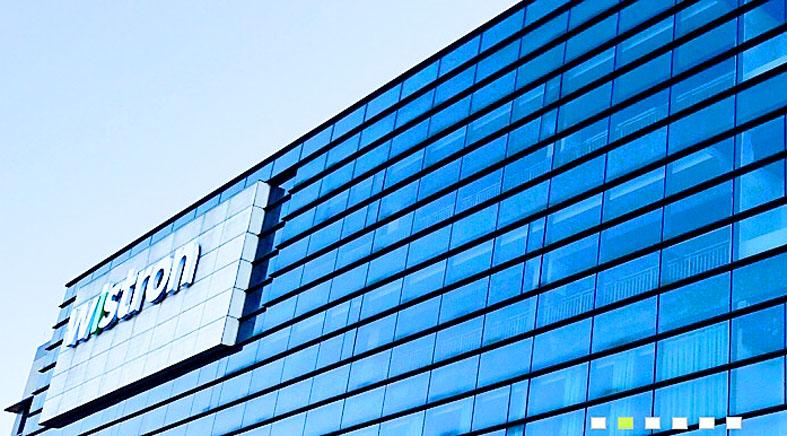Taiwan’s Wistron Corp (緯創) is partnering with India’s Optiemus Electronics to build products such as smartphones and laptops, a boost to Indian Prime Minister Narendra Modi’s push to make the nation an electronics manufacturing hub.
As part of the deal with contract manufacturer Wistron, Optiemus is to invest about US$200 million to ramp up electronics manufacturing in the next three to five years, the two companies said.
The partnership is expected to yield revenues of 380 billion rupees (US$5.12 billion) over five years for Optiemus, the company said, adding that it plans to hire about 11,000 workers for its two plants on the outskirts of New Delhi.

Photo copied by Chen Jo-chen, Taipei Times
It currently has a workforce of about 300.
“Wistron wants to grow its footprint in India, Optiemus wants to leverage the government initiatives [in electronics manufacturing] ... so it makes sense to come together from a win-win point of view,” said Optiemus managing director A. Gururaj, who once led Wistron in India.
The success of India’s electronics manufacturing sector is key to Modi’s ambition of turning the nation into the factory of the world.
In a bid to boost exports, Modi has announced production-linked incentive (PLI) programs that pay manufacturers for revenue from locally made goods.
Although foreign companies need to make phones and laptops above a certain value to get PLI benefits, there is no such threshold for Indian companies.
That means Wistron and Optiemus, which have won PLI approvals for smartphones and information technology products, can make cheaper products and still get government incentives.
“Optiemus is in very advanced discussions with a large global company to make smartphones,” said Gururaj, declining to name the client.
The Wistron-Optiemus partnership is also key to Wistron’s business ambitions in India, which have so far rested largely on Apple Inc, its key client in the nation.
Wistron entered India in 2015 by buying a minority equity stake in Optiemus in a partnership that assembled devices for other brands, including Taiwan’s HTC Corp (宏達電) and South Korea’s LG. Wistron has since sold its equity back to Optiemus.
Wistron in 2017 began assembling iPhones in a small plant in Bengaluru and has since expanded to a much bigger factory in Karnataka State’s Narasapura industrial area.
Worker discontent over unpaid wages led to a riot at the Naraspura factory late last year, leading Apple to put Wistron on probation.
“Wistron’s partnership with Optiemus will help it scale and diversify manufacturing in India to other products beyond smartphones and key client Apple, as well as assemble devices locally for other global clients,” said Neil Shah of Hong Kong-based technology analytics firm Counterpoint Research.
Apart from being a key Apple supplier, Wistron also makes laptops for Dell, Xiaomi Corp (小米) and Acer Inc (宏碁), as well as Intel-based servers.

Taiwan Semiconductor Manufacturing Co (TSMC, 台積電) yesterday said that its investment plan in Arizona is going according to schedule, following a local media report claiming that the company is planning to break ground on its third wafer fab in the US in June. In a statement, TSMC said it does not comment on market speculation, but that its investments in Arizona are proceeding well. TSMC is investing more than US$65 billion in Arizona to build three advanced wafer fabs. The first one has started production using the 4-nanometer (nm) process, while the second one would start mass production using the

When an apartment comes up for rent in Germany’s big cities, hundreds of prospective tenants often queue down the street to view it, but the acute shortage of affordable housing is getting scant attention ahead of today’s snap general election. “Housing is one of the main problems for people, but nobody talks about it, nobody takes it seriously,” said Andreas Ibel, president of Build Europe, an association representing housing developers. Migration and the sluggish economy top the list of voters’ concerns, but analysts say housing policy fails to break through as returns on investment take time to register, making the

‘SILVER LINING’: Although the news caused TSMC to fall on the local market, an analyst said that as tariffs are not set to go into effect until April, there is still time for negotiations US President Donald Trump on Tuesday said that he would likely impose tariffs on semiconductor, automobile and pharmaceutical imports of about 25 percent, with an announcement coming as soon as April 2 in a move that would represent a dramatic widening of the US leader’s trade war. “I probably will tell you that on April 2, but it’ll be in the neighborhood of 25 percent,” Trump told reporters at his Mar-a-Lago club when asked about his plan for auto tariffs. Asked about similar levies on pharmaceutical drugs and semiconductors, the president said that “it’ll be 25 percent and higher, and it’ll

CHIP BOOM: Revenue for the semiconductor industry is set to reach US$1 trillion by 2032, opening up opportunities for the chip pacakging and testing company, it said ASE Technology Holding Co (日月光投控), the world’s largest provider of outsourced semiconductor assembly and test (OSAT) services, yesterday launched a new advanced manufacturing facility in Penang, Malaysia, aiming to meet growing demand for emerging technologies such as generative artificial intelligence (AI) applications. The US$300 million facility is a critical step in expanding ASE’s global footprint, offering an alternative for customers from the US, Europe, Japan, South Korea and China to assemble and test chips outside of Taiwan amid efforts to diversify supply chains. The plant, the company’s fifth in Malaysia, is part of a strategic expansion plan that would more than triple